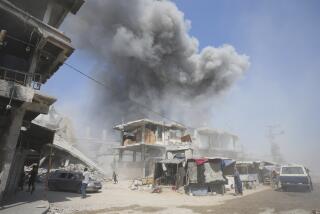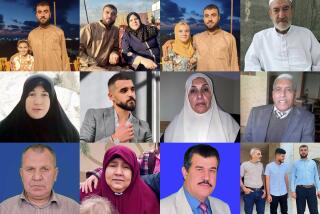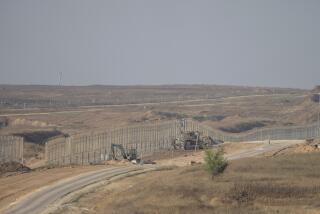Israel Invades Ramallah in Show of Might
JERUSALEM â The Israeli army took control of the West Bank city of Ramallah in a massive display of force Tuesday, battling gunmen, digging trenches across roads, searching homes and detaining hundreds of men in the nerve center of the Palestinian Authority.
The siege of Ramallah and continued attacks in the Gaza Strip represent Israelâs largest military offensive in the West Bank and Gaza Strip since capturing the territories in the 1967 Middle East War. The campaign follows a string of Palestinian suicide attacks on Israelis.
Tuesdayâs invasion of Ramallah and overnight incursion into Gazaâs Jabaliya refugee camp were part of a 13-day-old, wide-scale hunt for Palestinian gunmen in towns, villages and refugee camps. Thirty-five Palestinians were killed in a 24-hour period ending Tuesday night.
The army said it means to crush militias that are targeting Israelis, but even as tanks patrolled Ramallahâs streets, two gunmen opened fire on Israeli motorists near the countryâs border with Lebanon, killing six people and wounding seven before being slain by security forces.
Lt. Gen. Shaul Mofaz, the army chief of staff, told a committee of the Knesset, Israelâs parliament, that 20,000 troops were deployed in the West Bank and Gaza and that the army has just called up 1,000 reservists who live in Jewish settlements to guard their communities.
Alarmed by the bloodletting, U.N. Secretary-General Kofi Annan urged both sides to âlead your peoples away from disaster.â In an especially harsh criticism of Israel, he called on the Jewish state to end its âillegal occupationâ of Palestinian land and halt âthe bombing of civilian areas, the assassinations, the unnecessary use of lethal force, the demolitions and the daily humiliation of ordinary Palestinians.â
He also told the Palestinians that they were doing irreparable harm to their own cause by failing to stop acts of terror, especially suicide bombings, which he termed âmorally repugnant.â
Late Tuesday, the U.N. Security Council approved, 14-0, a U.S.-drafted resolution that for the first time endorses a Palestinian state. Syria abstained from voting on the measure, which also calls for a cease-fire and resumed negotiations.
The resolution in part cites âa vision of a region where two states, Israel and Palestine, live side-by-side within secure and recognized borders.â
Earlier, more than 100 tanks rolled into Ramallah, neighboring Al Birah and the nearby village of Beitunia late Monday night, just three days before U.S. envoy Anthony C. Zinni is due here to try again to secure a cease-fire.
Troops and tanks stayed out of downtown Ramallah and didnât enter the headquarters of Palestinian Authority President Yasser Arafat, although they came close. They entered most other neighborhoods and the Al Amari refugee camp in southern Ramallah, where hundreds of men were rounded up for interrogation.
Israeli soldiers issued calls on bullhorns for men and boys in Al Amari to surrender. Residents said few complied. The Palestinian Authority urged inhabitants to resist the troops, and Palestinians reported that at least three policemen and two militia fighters were shot dead in sporadic fighting with soldiers that raged through deserted streets.
âItâs very tense,â said Khaled Helou, a physician who lives in Al Amari. âEveryone is waiting for something worse to happen. Weâre getting ready for something big.â
Army bulldozers broke Ramallahâs main water lines when they dug a trench down the main road, and water gushed from the underground pipes for hours. Soldiers took over an apartment building in Al Amari and demolished a home belonging to a female suicide bomber who killed herself and an elderly Israeli in January.
Much of the shooting raged around Ramallahâs hospital, where tanks took up position early in the day. Younis Khatib, director of the Palestine Red Crescent Society, said tanks fired on an approaching ambulance. The tanks pulled back in midafternoon but returned by dusk.
Palestinian gunmen of the Al Aqsa Martyrs Brigade shot dead a suspected collaborator and strung him by his feet from a metal sculpture in Ramallahâs main square. Gunmen accused him of having betrayed three members of the militia to the Israelis.
Army Col. Gal Hirsh said the Ramallah invasion was meant to âput a wall between the terrorists and Israeli citizens.â
But as Hirsh briefed reporters in Jerusalem, two Palestinian gunmen took up position on a slope above a road in northern Israel and opened fire on passing motorists. Three women, the teenage daughter of one of them, and a police officer were among the six shot dead. Seven others were injured. The gunmen reportedly wore Israeli army uniforms and were armed with Kalashnikov rifles.
âI heard a boom, and my front windshield took a shot,â bus driver Mousa Ayoub said. âI stepped on the gas and heard shooting from both directions. It is a miracle I was saved.â
The attack occurred on the road between Kibbutz Metsuba and the town of Shlomi, just inside the border with Lebanon, in northwestern Israel. Large numbers of soldiers and police were deployed to Kibbutz Metsuba, a sleepy communal farm with 550 residents.
Moran Sivan, 28, a postal worker, said she was alone in her kibbutz home when she heard gunfire. âI ran up to the dining hall,â she said in a telephone interview, âand I saw the bus, and I saw the driver. You could see where the bullets hit the bus.â
Sivan said she and other kibbutz members were in a state of shock. âNo one ever thought this would reach us,â Sivan said. âWe felt pretty safe until nowâ from the suicide attacks that have been mostly focused on cities inside pre-1967 Israel and Jewish settlements in the West Bank and Gaza.
Israeli military intelligence has for months charged that the Lebanese Shiite militia Hezbollah is trying to open a second front on the border to help Palestinians who have been battling Israel since September 2000. Hezbollah periodically shells the Shabaa Farms area that Israel seized from Syria in the 1967 Middle East War. Hezbollah claims the area belongs to Lebanon.
Initial reports of the shooting attack on Route 70 said the gunmen were believed to have infiltrated from Lebanon. As the drama unfolded, Israeli Foreign Minister Shimon Peres phoned Annan to ask that he appeal to Syria and Lebanon to rein in Hezbollah.
By evening, Israeli security forces said that they had no evidence there had been an incursion from Lebanon and that they suspected the gunmen were Palestinian.
Palestinians have vowed to carry out attacks inside Israel to avenge the deaths of scores of gunmen and civilians killed during the armyâs raids in the first days of this month.
In the Gaza Strip on Tuesday, Israeli armor and infantry pulled out of Jabaliya after 18 Palestinians were killed in two hours. Later, helicopter gunships shelled a welding factory in Khan Yunis, killing four workers. The army alleged the factory was producing weapons.
Hirsh said the army had âno choiceâ but to pursue militants into the heart of refugee camps and even Ramallah.
âIn the last few weeks, we have been under massive, unprecedented terrorist attack,â Hirsh said. âWe could not stand it anymore, and we decided to act inside the Palestinian Authority areas.â
The army has arrested several dozen wanted men, destroyed 10 to 20 explosives laboratories and confiscated hundreds of weapons in the past 10 days, Hirsh said. In mass roundups of hundreds of Palestinian men and boys in the refugee camps, the detainees were handcuffed, forced to strip to their undershirts and blindfolded.
Hirsh apologized for soldiers who had penciled numbers on the hands of some detainees, a practice he described as âa mistakeâ that was not army policy.
*
Times staff writer Tracy Wilkinson at the Jabaliya refugee camp and special correspondent Maher Abukhater in Ramallah contributed to this report.
More to Read
Sign up for Essential California
The most important California stories and recommendations in your inbox every morning.
You may occasionally receive promotional content from the Los Angeles Times.










